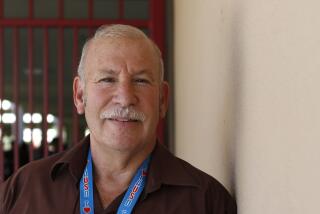Plenty of advice for L.A. Unified’s boss
Any day now, I expect to see a crowd of substitute teachers marching around Los Angeles Unified School District headquarters, wearing signs that say “I AM PATRENA SHANKLING” and waving lists of dumb things that substitutes have been asked to do.
Shankling is the substitute teacher fired by Supt. John Deasy last fall, after he scolded her for giving 12th-grade students what he considered busywork: copying class procedures from a sheet of paper into their composition books.
Since a Times profile on Deasy and my column this week on the incident, teachers have rallied to Shankling’s defense, describing in emails, letters and online comments the hard life of a substitute.
“Deasy doesn’t seem to grasp the reality of the role of a substitute teacher,” wrote Marie Brown, a former sub in a district outside of L.A. Unified. “We don’t work if the teachers do not ‘like us,’ ” her email said. “And, from my experience, teachers do not like any feedback from subs that is implicitly critical.”
Deasy, trying to raise the academic bar, considered Shankling’s rote assignment a waste of students’ time. And he bristled at her “I’m just following orders” response when he questioned her in class about it.
But Brown said Shankling’s students were lucky that the substitute had a lesson plan to go on.
“I was rarely given instructions to actually teach something,” Brown wrote. “It is always busy work.…Thus, your major goal becomes keeping students quiet and in their seats....Many times I have thought how disturbed the general public would be if they knew what I know.”
If you’re the parent of a student who has been through public school, you might already know. You’ve heard the stories of unruly classes, pointless movies and oddball subs.
The typical student spends the equivalent of one school year with a substitute. Some are newly minted teachers, others career changers or retirees. Many are flexible and competent, but know nothing about the students they’re assigned and little about the subjects they’re asked to teach.
“The school is not interested in your area of expertise,” wrote a sub from Santa Clarita. “They want to know if you can fog a mirror.”
Fogging a mirror isn’t enough. Ask Arthur Christopher Schaper, who spent last year subbing at schools in the Centinela Valley Union High School District. He was cursed out and mocked in class, and had things thrown at him by students so undisciplined their previous teachers had resigned, he said.
Now he’s better at his job and he’s satisfied with his sub assignments at Lawndale’s Leuzinger High.
In hindsight he knows his learning curve shortchanged his former students. “When I accepted that teaching just is not my bag,” he wrote, “I could look back on what I endured, and say, ‘I made out like a bandit, compared to those kids....’ ”
::
What struck me most in the reader feedback was the cynicism of so many teachers who feel under fire and disillusioned, bombarded by waves of mandated “reforms” that have little to do with the challenges they encounter in their classrooms.
The superintendent, they said, ought to walk in their shoes. “He’s the best we’ve had since I began teaching secondary English, mid-’80s,” wrote Jim Rodriguez of Whittier. “HOWEVER, his tirade, the second day of a new school year, was just plain nuts.”
Deasy did have his defenders, impressed by his commitment to improvement and shocked by the academic deficiencies of the students Shankling was teaching that morning.
“The real horror is how inept these senior students are in the understanding and use of the English language. Who do they think will hire them when they are unable to send even a simple memo that is grammatically correct?” asked Carolyn Ziegler-Davenport, whose children and grandchildren graduated from public schools.
“I would much rather have a person like Deasy, who understands this, in charge,” she said, “than yet another apologist unwilling to make tough calls.”
::
Deasy began his career as a high school teacher in Rhode Island, but his expertise is in the intricacies of school reform. That’s the hat he expected to wear when he signed on in Los Angeles.
Instead, he’s been bombarded with challenges whose collective dimensions he couldn’t have imagined, including a budget squeeze that’s gutted programs and forced layoffs, and a teacher sex-abuse scandal that’s unfolding like a horror story.
Deasy hasn’t asked, but here’s my advice, as someone who’s tracked this district for 25 years and ushered three children through its schools:
Decide what you want your legacy to be. Focus on the big things and file away the others.
Ten minutes wasted rewriting class rules is nothing to get worked up about. If that enraged the superintendent, we’re lucky he didn’t visit the science class where the sub had been ordered by the absent teacher to screen Will Smith’s “I Am Legend,” a movie about predatory, cannibalistic beings.
Take a lesson from your predecessors.
Former Superintendent Roy Romer built new schools and got children off buses. His push to standardize reading instruction sent elementary literacy scores climbing.
Recently retired Ray Cortines shepherded the growth of “Public School Choice,” allowing outside groups to run new schools and charter programs on traditional campuses. He was willing to buck the teachers’ union to replace the staffs of failing campuses.
And David Brewer? The retired Navy vice admiral was a short-term failure, fired midway through his four-year contract because he never managed to get beyond declaring himself “a champion for the children, teachers and staff.”
Deasy is off to a promising start, with his focus on assessment-driven instruction and his willingness to challenge the tenure process and weed out incompetent instructors. He has the district on the verge of adopting an evaluation process based on student achievement, allowing teachers and parents to understand what’s working and what is not.
None of that can be accomplished without the cooperation of district teachers.
Deasy is clearly guided by the best interests of students. That’s what fuels his impatience. It is also what ought to unite him with teachers, who stuck it out through difficult times because they care about helping children.
But incidents like this classroom blowup drain their confidence in the superintendent.
If they’re going to trust you to weed the garden, they have to believe that you know what a flower is.
More to Read
Start your day right
Sign up for Essential California for news, features and recommendations from the L.A. Times and beyond in your inbox six days a week.
You may occasionally receive promotional content from the Los Angeles Times.






